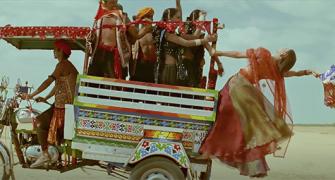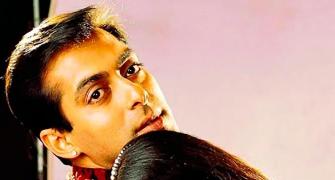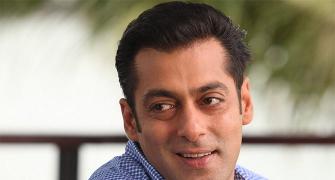Was romance invented so that Sanjay Leela Bhansali would one day make Hum Dil De Chuke Sanam, which released on June 18, 1999, asks Subhash K Jha.

I was a normal movie maniac until I saw Hum Dil De Chuke Sanam on June 18, 1999.
Thereafter, my life as a cineaste underwent a complete change.
Nothing that any film-maker does compares with my favourite film.
Don't get me wrong.
I am not saying my friend Sanjay Leela Bhansali has made the best film ever. Or perhaps I am saying that.
And don't let the 'friend' before his name distort the truth. I became friends with the director only after he made Hum Dil what-have-you.
I still remember that morning after the devastating experience.
Before Hum Dil De Chuke Sanam, all I knew about Sanjay was through Khamoshi: The Musical.
I expected to encounter an arrogant, impetuous, director conscious of his genius as a director.
After all, Sanjay was the most romantically-enthused and sensitive film-maker since Guru Dutt and and Bimal Roy -- and let's not beat around the 'blush' about such immodest evaluations.

On that morning after Hum Dil De Chuke Sanam, Sanjay surprised me.
The first thing he said to me after I introduced myself was, 'If you're a fan of Lataji, I am double her fan.'
That's how our friendship started.
Two Lata bhakts mulling and squabbling over her melodies, regretting why the Nightingale didn't hum in Hum Dil De Chuke Sanam.
Over the weeks that followed, I lived every moment of Sanjay's agony and ecstasy as reports of not-doing-well/doing-well/doing-so-so/doing-fine poured in from all parts of the world. Neither Sanjay nor I could understand how his film could be anything but a revolutionary success.
Absolutely flawless and foolproof, there is a melodious methodology motivating every rhythm and gesture in Sanjay's neo-classic.
Sure, Khamoshi was also a great work of art with emotions that stirred you, but Hum Dil... is something more, something indescribably exquisite and achingly beautiful.
You know that feeling you get when you listen to Lataji singing Hai Tere Saath Meri Wafaa Main Nahin To Kya?
Does that feeling have a name?
How do you define the sparkling spray of sensuous emotions that Sanjay brings to life in Hum Dil?

From the opening montage of Aishwarya Rai chasing a cart full of kite-flying revellers through the deserts of Rajasthan accompanied to the sounds of Shankar Mahadevan's Man Mohini, you are hooked, completely spellbound and enslaved to the cadences of the nubile narration.
Cinematographer Anil Mehta has filmed Sanjay's passion-play with a sumptuous splendour that overpowers and subjugates our senses.
Indeed, Hum Dil... is like a seven-course banquet where the dishes are so light in the tummy you never feel the unbearable heaviness of the yummy: Raj. It comes as a shock to know that Mehta did not shoot Sanjay's Devdas. It was Binod Pradhan who lit up Sanjay's next romantic opus.
A film like Hum Dil... isn't made. It just happens.
'You're right,' sighs Sanjay after collecting his hundredth award for the most romantic film of the last millennium (yes, yes I know the Guru Dutt cinephiles are affronted but what to do when hum dil de chuke sanam?). 'Hum Dil De Chuke Sanam just happened.'
I may be over-reacting, but I believe the work's greatness has been under-estimated by our esteemed critics.
In fact, the sum total of the work is far greater than its parts because what Hum Dil... tells us at the last is: 'Love's not about conquering but concurring.'
You may love and lose but the loss subsumes a wealth of triumph in terms that neither money nor any earthly power can control.
There's an arcadian innocence at the centre of the tale.
The girl Nandini (Aishwarya Rai) is so pampered and protected from the outside world of corruption and heartbreak that she thinks a kiss can cause pregnancy.
'Aise thoda hi na hota hai,' Salman Khan chides her gently with a shy smile.

No actor should be bigger than the film.
The trouble with making a huge film with big stars is that the stars' images end up dominating the film's other qualities.
This didn't happen in Hum Dil De Chuke Sanam. Not for a second were we looking at Aishwarya Rai, Salman Khan and Ajay Devgn.
Or for that matter, Vikram Gokhale, Smita Jayekar or Sanjay's all-time favourite screen performer, Helen.
Every actor filled the frames with a happy and hectic conviction.
On most occasions when a director adopts the epic canvas, he shows the characters as casualties of the mammoth surroundings that accommodate the characters.
This is as true of David Lean's masterly desert epic Lawrence Of Arabia as it is of Abbas-Mustan's Soldier which situated its terrible battles in the sandscape.
In Hum Dil... all battles are fought in the heart. Whether it's the haveli with its rhythmic riot of rainbowy shades or the brilliantly sombre granite-and-silt smoothness of Budapest -- the striking landscape perfectly and effortlessly complements the majesty of the heart.

The story is inspired by a folk tale about a young man who joins a joint family, and falls in love with the girl of the family where he's come to be educated.
When her father learns the truth, he exercises his rights as a guru and demands that the boy never look at his daughter for as long as he lives.
Like an obedient shishya, the man makes the promise.
Decades pass.
At the ripe old age of 80, the now-blind lover finally goes before his beloved and says, 'I've kept my promise to your father.'
Sanjay converts the folk tale into a modern day fantasia-romance where muslin dupattas rub shoulders with the baroque interiors of symphony chambers where the lovers' pleas echo with anguished resonance.
There are images in Hum Dil De Chuke Sanam that will remain alive in our hearts for as long as cinema lives.
When Salman leaves the haveli, the girl crashes into the chandelier as she rushes out to look at her man for the last time.
The chandelier overturns and her dupatta catches fire.

As Anil Mehta's camera trails after Aishwarya with her dupatta on fire, our hearts leap into flaming circles of protest at the sheer injustice of separating the lovers.
From this point when we are one with Salman and Aishwarya, the narrative has to wean us away from love's tangles to a complete faith in the sanctity and purity of the marital vows when the husband Ajay Devgn's nobility becomes a metaphor for selfless love. How can a man who takes his wife in search of her lover, go unrewarded?
It's to Sanjay's credit that Devgn's character never appears wimpish even when he weeps in drunken heartbreak under that fateful bridge in Budapest (posing as Italy in the narrative).
When at the end, Aishwarya, clutching her mangalsutra in her hand, wearing a flaming-red sari symbolising her bleeding heart, runs into her husband Ajay Devgn's arms on the bridge, there's water under her feet and fireworks in the sky.
The elements merge in magnificent leaps of inventive film-making.

While we look at Hum Dil De Chuke Sanam, we only see beauty and harmony.
We never think of the ugliness that underlines human relationships. Sanjay Bhansali makes the world love his lovers. And yet, when it's time to dwell on the sanctity and completeness of the saat pheraS, we are never at sixes and sevens with his narration.
Salman Khan was convinced that the woman should leave her husband and come back to her lover. He even sought the intervention of his buddy Sooraj Barjatya to convince Sanjay to change the ending.
But Sanjay was adamant.
'How could I send my heroine to her lover when she's already accepted her husband as the man in her life?' he reasoned.
There are no doubtful moments in Hum Dil De Chuke Sanam.
The dilemmas of the characters are so transparent and focused, we simply flow with the tension.
We are enthralled by the film's melody majesty and drama.
At the same time, we are also taken up by the sheer weightlessness of the epic.

The songs. Ah, the songs!
They do not move. They swim and waltz.
Catch the myriad play of light and shade on Aishwarya's face as she glides in and out of the wedding congregation flirting, hurting and floating with her lover to the sounds of Aankhon Ki Gutakhiyan Maaf Ho.
Will I ever again see a film as picture perfect as Hum Dil De Chuke Sanam?
Can Sanjay ever do it again?
I am afraid there can only be one answer: No.
Hum Dil De Chuke Sanam is cinema at its purest.
The fantasy-romance coalesces into the neo-realism of contemporary times so that we never know when the fairytale ends and the intense love triangle begins.
Sanjay sweeps us into a tide of tumultuous events in the lives of his three protagonists.
Finally, we are left gasping for breath, believing in the power of love to heal the hurt.
Was romance invented so that Sanjay Leela Bhansali would one day make a film called Hum Dil De Chuke Sanam about it?










